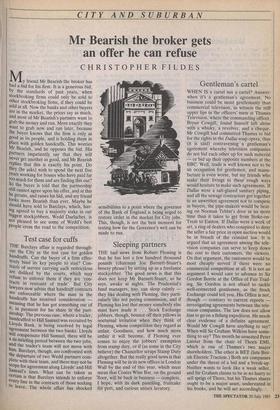Gentleman's cartel
WHEN IS a cartel not a cartel? Answer: when it's a gentleman's agreement. No business could be more gentlemanly than commercial television, as witness the stiff upper lips in the officers' mess at Thames Television, where the commanding officer, Bryan Cowgill, found himself left alone with a whisky, a revolver, and a cheque. Mr Cowgill had committed Thames to bid for the rights in the Dallas soap opera, thus (it is said) contravening a gentleman's agreement whereby television companies do not bid each other up for such material — or bid up their opposite numbers at the BBC. Well, trade is well known not to be an occupation for gentlemen, and manu- facture is even worse, but my friends who make their livings in these rough ways would hesitate to make such agreements. If Dallas were a salt-glazed sanitary piping, and all the sewage contractors got together in an unwritten agreement not to compete as buyers, the pipe-makers would be beat- ing on Norman Tebbit's door in no more time than it takes to get from Stoke-on- Trent to Euston. If Dallas were a work of art, a ring of dealers who conspired to deny the seller a fair price in open auction would be in breach of the criminal law. It is argued that an agreement among the tele- vision companies can serve to keep down the cost to their customers, the viewers. On that argument, the customers would be most cheaply served if there were no commercial competition at all. It is not an argument I would care to advance to Sir Gordon Borrie at the Office of Fair Trad- ing. Sir Gordon is not afraid to tackle well-connected gentlemen, as the Stock Exchange could tell you. His Office is not, though — contrary to current reports investigating agreements between the tele- vision companies. The law does not allow him to go on a fishing expedition. He needs clear evidence of a definite agreement. Would Mr Cowgill have anything to say? When will Sir Graham Wilkins have some- thing to say? This month he unseated Peter Laister from the chair of Thorn EMI, which is one of Thames's two major shareholders. The other is BET (late Brit- ish Electric Traction.) Both are companies under the threat of a bid and a break-up. Neither wants to look like a weak seller, and Sir Graham claims to be in no hurry to sell sprigs of Thorn, but his Thames shares ought to be a major asset, understated in his books, and he will act accordingly.


















































 Previous page
Previous page